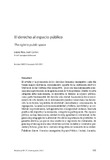Mostrar el registro sencillo del ítem
Derecho al espacio público
| dc.rights.license | http://creativecommons.org/licenses/by-nc-sa/3.0/ve/ | |
| dc.contributor.author | López Roa, Juan Carlos | |
| dc.date.accessioned | 2013-05-14T18:33:27Z | |
| dc.date.available | 2013-05-14T18:33:27Z | |
| dc.date.issued | 2013-05-14T18:33:27Z | |
| dc.identifier.issn | 1317-9535 | |
| dc.identifier.uri | http://www.saber.ula.ve/handle/123456789/37061 | |
| dc.description.abstract | El estudio y la promoción de los derechos humanos emergentes cada día toman mayor relevancia, especialmente a partir de la celebración del Foro Universal de las Culturas-Barcelona 2004, pues son una herramienta esencial para la producción de la agenda social de todo gobierno. Dentro de esta categoría antes mencionada, se encuentra el derecho al espacio público, como parte fundamental del derecho a la ciudad. La ausencia de reconocimientode este derecho en el ordenamiento jurídico venezolano, ha favorecido la exclusión, la pérdida de identidad comunitaria y comunicación, la segregación, la carencia de monumentalidad y belleza, movilidad y accesibilidad, la privatización, la fragmentación e inseguridad. Además, limita la práctica del deporte y la recreación, e impide la participación. Sin espacio público, no hay democracia, calidad de vida, igualdad ni solidaridad; se degenera la pedagogía de la alteridad. De allí la importancia de posibilitar su garantía efectiva, ya que es una condición y expresión de ciudadanía, de gran importancia para la sana subsistencia de las ciudades y sociedades presentes y futuras, pues de lo contrario ésta podría ser la muerte de la ciudad. | es_VE |
| dc.language.iso | es | es_VE |
| dc.rights | info:eu-repo/semantics/openAccess | |
| dc.subject | Derechos emergentes | es_VE |
| dc.subject | Espacio Público | es_VE |
| dc.subject | Ciudad | es_VE |
| dc.subject | Garantía | es_VE |
| dc.title | Derecho al espacio público | es_VE |
| dc.title.alternative | The right to public space | es_VE |
| dc.type | info:eu-repo/semantics/article | |
| dc.description.abstract1 | The study and promotion of the emerging human rights has become increasingly relevant in recent years, especially after the 2004, Barcelona Universal Forum of Cultures. These rights, have turned into an essential tool for social legislation for any government. Within this category, one can find the right to public space as a fundamental part of the right to the city. The absence and disregard for this collective right in the legal ordering of Venezuela has favored social exclusion, limited participation, the loss of community identity and communication, segregation, the lack of monumentality and beauty, privatization, fragmentation and insecurity, reduced mobility and accessibility, limited spaces for sports and recreation. Without public spaces, there is no democracy nor quality of life, no equality nor solidarity. The pedagogy of otherness is perverted. Thus, the importance in guaranteeing effectively this right. It is necessary for the condition and expression of citizenship and therefore, of great relevance for the healthy existence of cities presently and in the future. The opposite could mean the death of the city. | es_VE |
| dc.description.colacion | 105-136 | es_VE |
| dc.description.email | lopezqjuan@yahoo.com | es_VE |
| dc.description.frecuencia | semestral | |
| dc.publisher.pais | Venezuela | es_VE |
| dc.subject.centroinvestigacion | Centro Iberoamericano de Estudios Provinciales y Locales (CIEPROL) | |
| dc.subject.facultad | Facultad de Ciencias Jurídicas y Políticas | es_VE |
| dc.subject.institucion | Universidad de Los Andes | es_VE |
| dc.subject.keywords | Emerging rights | es_VE |
| dc.subject.keywords | Public Space | es_VE |
| dc.subject.keywords | City | es_VE |
| dc.subject.keywords | Guarantee | es_VE |
| dc.subject.seccion | Revista Provincia: Artículos | es_VE |
| dc.subject.thematiccategory | Ciencias Económicas y Sociales | es_VE |
| dc.subject.thematiccategory | Ciencias Jurídicas y Políticas | es_VE |
| dc.subject.tipo | Revistas | es_VE |
| dc.type.media | Texto | es_VE |
Ficheros en el ítem
Este ítem aparece en la(s) siguiente(s) colección(ones)
-
Provincia - Número 027
Enero - Junio 2012


